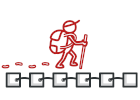
Iterator w języku Python
Iterator to behawioralny wzorzec projektowy pozwalający sekwencyjnie przechodzić od elementu do elementu jakiegoś zbioru bez konieczności eksponowania jego formy.
Dzięki Iteratorowi klienci mogą przeglądać kolejne elementy różnych kolekcji w podobny sposób, za pośrednictwem jednego interfejsu.
Złożoność:
Popularność:
Przykłady użycia: Wzorzec Iterator jest bardzo rozpowszechniony w kodzie Python. Wiele frameworków i bibliotek pozwala za jego pomocą poruszać się po elementach ich kolekcji.
Identyfikacja: Iterator łatwo rozpoznać po obecności metod nawigacyjnych (takich jak następny, poprzedni i innych). Kod klienta stosujący iteratory może nie mieć bezpośredniego dostępu do badanej kolekcji.
Przykład koncepcyjny
Poniższy przykład ilustruje strukturę wzorca Iterator ze szczególnym naciskiem na następujące kwestie:
- Z jakich składa się klas?
- Jakie role pełnią te klasy?
- W jaki sposób elementy wzorca są ze sobą powiązane?
main.py: Przykład koncepcyjny
from __future__ import annotations
from collections.abc import Iterable, Iterator
from typing import Any
"""
To create an iterator in Python, there are two abstract classes from the built-
in `collections` module - Iterable,Iterator. We need to implement the
`__iter__()` method in the iterated object (collection), and the `__next__ ()`
method in theiterator.
"""
class AlphabeticalOrderIterator(Iterator):
"""
Concrete Iterators implement various traversal algorithms. These classes
store the current traversal position at all times.
"""
"""
`_position` attribute stores the current traversal position. An iterator may
have a lot of other fields for storing iteration state, especially when it
is supposed to work with a particular kind of collection.
"""
_position: int = None
"""
This attribute indicates the traversal direction.
"""
_reverse: bool = False
def __init__(self, collection: WordsCollection, reverse: bool = False) -> None:
self._collection = collection
self._reverse = reverse
self._sorted_items = None # Will be set on first __next__ call
self._position = 0
def __next__(self) -> Any:
"""
Optimization: sorting happens only when the first items is actually
requested.
"""
if self._sorted_items is None:
self._sorted_items = sorted(self._collection._collection)
if self._reverse:
self._sorted_items = list(reversed(self._sorted_items))
"""
The __next__() method must return the next item in the sequence. On
reaching the end, and in subsequent calls, it must raise StopIteration.
"""
if self._position >= len(self._sorted_items):
raise StopIteration()
value = self._sorted_items[self._position]
self._position += 1
return value
class WordsCollection(Iterable):
"""
Concrete Collections provide one or several methods for retrieving fresh
iterator instances, compatible with the collection class.
"""
def __init__(self, collection: list[Any] | None = None) -> None:
self._collection = collection or []
def __getitem__(self, index: int) -> Any:
return self._collection[index]
def __iter__(self) -> AlphabeticalOrderIterator:
"""
The __iter__() method returns the iterator object itself, by default we
return the iterator in ascending order.
"""
return AlphabeticalOrderIterator(self)
def get_reverse_iterator(self) -> AlphabeticalOrderIterator:
return AlphabeticalOrderIterator(self, True)
def add_item(self, item: Any) -> None:
self._collection.append(item)
if __name__ == "__main__":
# The client code may or may not know about the Concrete Iterator or
# Collection classes, depending on the level of indirection you want to keep
# in your program.
collection = WordsCollection()
collection.add_item("B")
collection.add_item("A")
collection.add_item("C")
print("Straight traversal:")
print("\n".join(collection))
print("")
print("Reverse traversal:")
print("\n".join(collection.get_reverse_iterator()), end="")
Output.txt: Wynik działania
Straight traversal:
A
B
C
Reverse traversal:
C
B
A